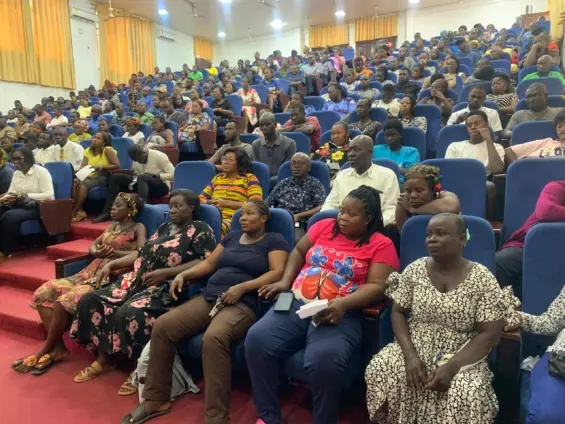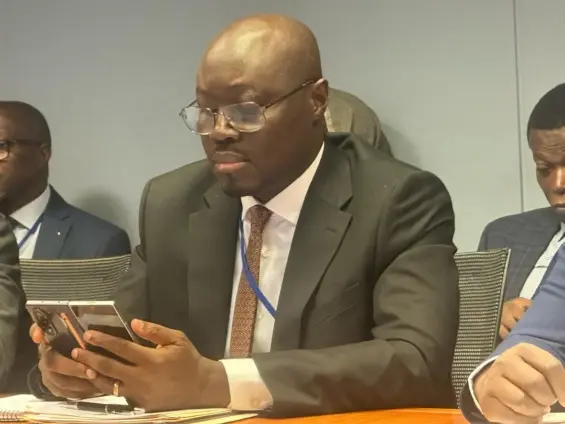The air crackles with tension as JoyNews, a prominent Ghanaian news outlet, defends its coverage of the Auditor-General’s report on the University of Ghana (UG). The core issue? Allegations that UG overstated employee compensation by a substantial GH¢59.2 million. This assertion, based on the Auditor-General’s findings, has ignited a firestorm, drawing sharp criticism from the university itself and its faculty association, UTAG-UG. They accuse JoyNews of unprofessional reporting, setting the stage for a battle over journalistic integrity and the interpretation of financial audits. The question remains: did JoyNews accurately reflect the Auditor-General’s report on the University of Ghana, or did its coverage misrepresent the facts?
The controversy stems from a report released on May 16, 2025, which scrutinized the University of Ghana’s financial records. According to the Auditor-General, there was a significant discrepancy between the salary claims submitted by UG – a staggering GH¢1.09 billion – and the approved amounts, which totaled GH¢1.03 billion. This GH¢59.2 million difference, the report suggested, represented an overstatement of employee compensation between 2022 and 2024. JoyNews picked up on these findings, publishing a report that amplified the Auditor-General’s concerns. However, this coverage was met with immediate and forceful pushback from the University of Ghana and UTAG-UG, who vehemently denied any wrongdoing.
The University of Ghana maintains that the GH¢59.2 million in question was not an overstatement but rather legitimate payments made from internally generated funds (IGF). These funds, they explain, were used to supplement government payroll allocations, covering expenses such as salaries for staff like post-retirement faculty. UG argues that the Auditor-General’s report fundamentally misinterprets the intended and approved use of these internally generated funds, painting a misleading picture of financial mismanagement. This disagreement forms the crux of the dispute, highlighting differing perspectives on the university’s financial practices.
In response to the accusations of unprofessional reporting, JoyNews is standing firm. The media outlet insists that its coverage was accurate and meticulously based on the official findings presented in the Auditor-General’s report. Evans Mensah, JoyNews Editor, has publicly stated that the university’s objections should be directed at the audit process itself, rather than at the media for simply reporting its conclusions. He emphasizes that JoyNews adhered to core journalistic ethics by accurately reflecting the content of a publicly available document, a document that holds significant implications for public accountability.
“Did the Auditor General, which is a constitutional legal body, find that the University of Ghana overstated its compensation by GHs59.2 million? As far as the document is concerned, yes, and that is factual,” Evans Mensah asserted, underscoring JoyNews’s perspective. This quote encapsulates the news organization’s position: they reported the facts as presented in the official audit.
Evans Mensah further addressed the controversy, pointing out what he sees as a misdirected focus. He criticized the University of Ghana for concentrating its efforts on media criticism instead of formally engaging with the Auditor-General to seek clarifications and address the concerns raised in the report. Mensah highlighted the apparent lack of a formal protest from the university community directed at the Auditor-General, suggesting that the university’s energy would be better spent addressing the source of the allegations. JoyNews, he reiterated, simply reported the findings of a publicly accessible audit document.
“Their quarrel is really with the Auditor General, and not with the journalist that simply reported the document that had been published by the Auditor-General,” Mensah stated, clarifying JoyNews’s perceived role in the dispute.
This dispute has far-reaching implications, raising fundamental questions about the intricate relationships between media organizations, auditing bodies, and public institutions. It underscores the critical importance of accurate and responsible reporting on financial audits, as these reports often serve as a cornerstone of public accountability. Moreover, the situation highlights the ever-present need for transparency and judicious management in the utilization of public funds. The ultimate resolution of this dispute, and the public’s perception of it, could significantly influence future reporting on similar matters, shaping the landscape of media scrutiny and public sector oversight.
The controversy surrounding JoyNews’ reporting on the Auditor-General’s report concerning the University of Ghana throws into sharp relief the inherent complexities of media coverage of financial audits. While the University of Ghana and UTAG-UG vociferously dispute the Auditor-General’s findings, JoyNews steadfastly defends the accuracy of its reporting, citing its reliance on official documentation. At the heart of the matter lies the interpretation of the Auditor-General’s report and the legitimacy of the university’s use of internally generated funds. Resolution will likely hinge on clarifications made directly to the Auditor-General. This case serves as a powerful reminder of the indispensable role of both transparency and accountability in the management of public funds, and the media’s crucial role in upholding these essential principles.
Image Source: MYJOYONLINE





















